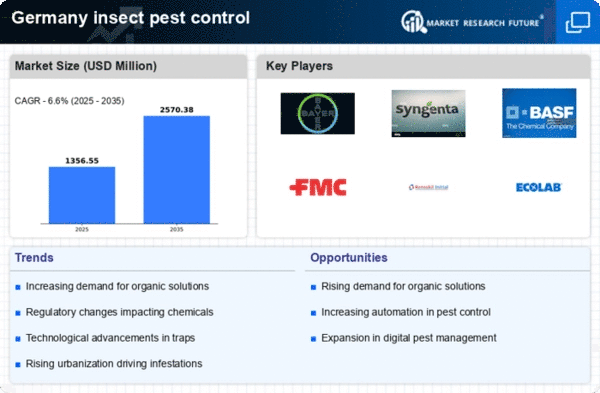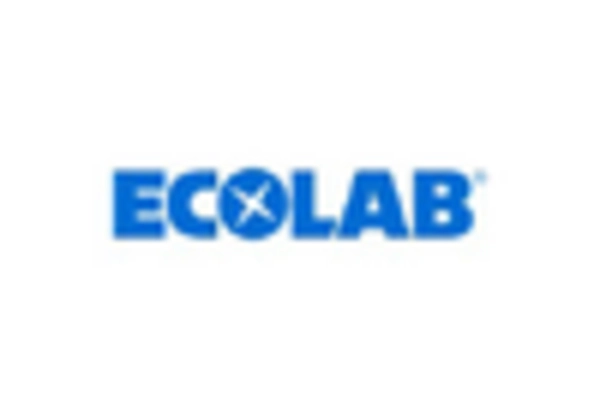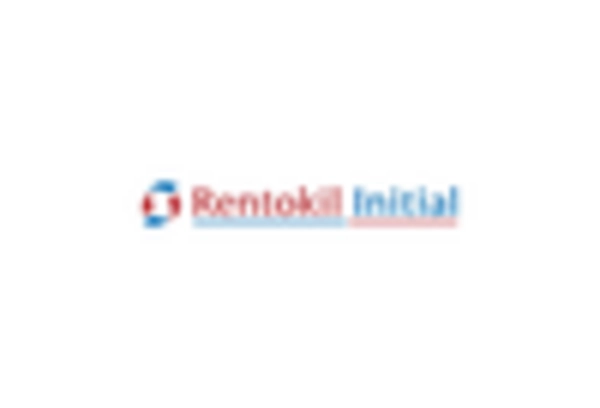Rising Consumer Awareness
Consumer awareness regarding health and environmental impacts is significantly influencing the insect pest-control market in Germany. As individuals become more informed about the potential risks associated with chemical pesticides, there is a growing preference for organic and eco-friendly alternatives. This shift in consumer behavior is prompting companies to diversify their product offerings, focusing on natural insect repellents and biopesticides. Market data indicates that the organic pest-control segment is expected to witness a growth rate of around 6.5% annually, as consumers increasingly prioritize safety and sustainability. Consequently, businesses that align their strategies with these consumer preferences are likely to thrive in the evolving landscape of the insect pest-control market.
Agricultural Sector Growth
The agricultural sector in Germany is witnessing robust growth, which is directly impacting the insect pest-control market. With an increasing focus on crop yield and quality, farmers are investing in advanced pest management solutions to protect their produce from infestations. The demand for effective pest control measures is expected to rise, particularly in the context of sustainable agriculture practices. Market analysis suggests that the agricultural segment of the insect pest-control market could expand by approximately 4.8% annually, driven by the need for enhanced productivity and food security. This growth presents opportunities for companies to introduce innovative products tailored to the specific needs of the agricultural community.
Regulatory Framework Enhancements
The insect pest-control market in Germany is experiencing a notable shift due to the evolving regulatory framework. Stricter regulations regarding pesticide usage are being implemented, which may compel manufacturers to innovate and develop safer, more environmentally friendly products. This regulatory landscape is likely to drive demand for integrated pest management solutions, as stakeholders seek compliance while maintaining efficacy. The market is projected to grow at a CAGR of approximately 5.2% over the next five years, reflecting the increasing emphasis on sustainable practices. As regulations tighten, companies that adapt swiftly to these changes may gain a competitive edge, thereby influencing the overall dynamics of the insect pest-control market.
Urbanization and Infrastructure Development
Urbanization in Germany is contributing to the expansion of the insect pest-control market. As cities grow and infrastructure develops, the prevalence of pest-related issues is likely to increase, necessitating effective pest management solutions. Urban areas, with their dense populations and diverse environments, present unique challenges for pest control. The market is expected to see a growth rate of around 5.5% as urbanization continues to drive demand for pest control services in residential and commercial settings. Companies that can adapt their strategies to address the complexities of urban pest management may find significant opportunities within the insect pest-control market.
Technological Advancements in Pest Management
Technological advancements are playing a crucial role in shaping the insect pest-control market in Germany. Innovations such as smart traps, drones for monitoring pest populations, and precision application techniques are enhancing the effectiveness of pest management strategies. These technologies not only improve operational efficiency but also reduce the environmental footprint associated with traditional pest control methods. The integration of data analytics and IoT in pest management is expected to drive market growth, with projections indicating a potential increase in market size by 7% over the next few years. As these technologies become more accessible, they are likely to redefine the standards of pest control in the insect pest-control market.
















